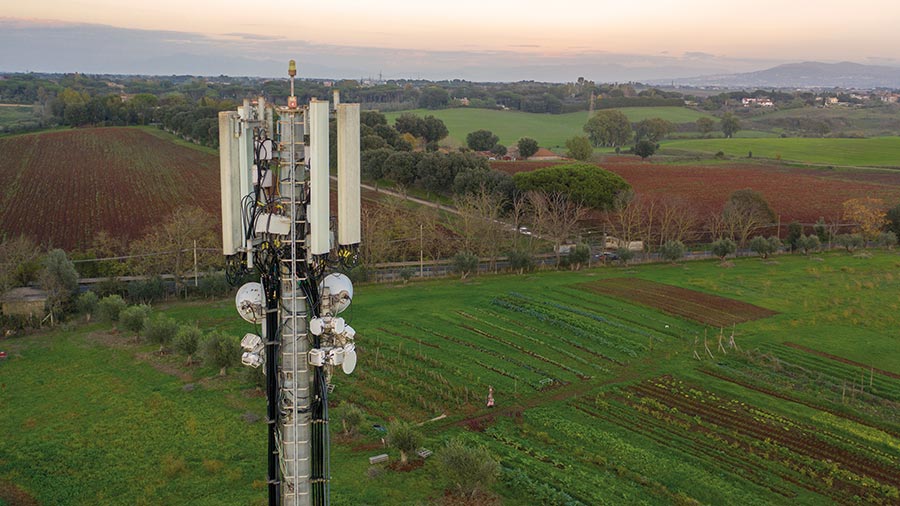Business Clinic: Is phone mast land lease renewal offer too low?
 © Stefano Tammaro/Adobe Stock
© Stefano Tammaro/Adobe Stock Whether it’s a legal, tax, insurance, management or land issue, Farmers Weekly’s experts can help.
Alistair Edwards, associate partner, telecoms at Carter Jonas, advises on how to deal with pressure from a telecoms operator to agree a much lower rent.
See also: Business Clinic – what pay rise should I give my arable farm manager?
Q: The lease on the telecoms mast on my land is coming to an end. The previous lease was for 10 years, with a rent of £5,000 a year, with inflation-linked annual rent reviews.
The operator has proposed all the same terms but with a rent of just £500 a year.
They are putting pressure on me to agree to the new lease terms in a very short time, but this seems like an unfair deal. What options do I have?
A: There are many cases where the telecoms operators are making very low offers in the first instance.
Under the Electronic Communications Code, whether you are dealing with an approach to site a new mast or negotiating a lease renewal on an existing mast, the landowner can oppose in only limited circumstances, such as proposed development.
The best option is to negotiate terms that maximise income but also are proportionate and minimise loss or burden to you during or after the lease term.
Under the new code rent for telecoms sites are assessed disregarding the “value to operator”, so often a starting position might be the alternative use that the land could be put to.
However, it is important to consider all the rights that the operator seeks, along with the extent of land that these apply to and any other burdens or obligations that might be placed on the landowner.
These often go far beyond what a landlord would be willing to agree to for other uses.
Tribunal decisions
The Upper Tribunal has already considered some of these matters in previous decisions.
The most relevant case for rural landowners, Dale Park, is two years old and the values attributed to the burdens associated with telecoms sites in that case do not sufficiently or accurately reflect the reality of hosting and managing a telecoms operator on land.
Those decisions and values determined in the tribunal (or in the County Court for Landlord and Tenant 1954 Act) use a statutory basis of valuation.
There is nothing to prevent an operator offering more than what they think could be achieved by imposition in the tribunal.
Such “consensual deals” might be double or more than the code value, and supplemented by capital payments or other incentives.
The level of deal depends on an understanding of the operator’s objectives, approach to valuation and bargaining position, which is why specialist advice is important.
A better understanding is emerging of the alternative uses for telecoms sites and the potential value of these.
For example, open storage would generate an annual rent of £30-£54/sq m, and a renewable energy scheme about £5,000 a year.
In addition to higher payments, these alternative uses also offer more flexible terms, a lower landowner burden, or a shorter lease.
The payments discussed above cover only the land required for the actual apparatus, the right to access the mast site and installing electricity and broadband or communication cables – in other words the utilities necessary for the primary use of the mast.
Additional rights or services should be negotiated separately and by agreement, together with additional consideration or compensation being paid by the operator.
These include temporary use of land adjacent to the site or main access (for storage of materials or parking), installation of electricity generators, a temporary additional mast site, or supervision of access.
Options
Even if you’re not ready to move forward with an alternative or own use at the point of renewal, you should consider agreeing a mid-term break, or “lift and shift” clause, to provide flexibility in future.
Finally, under the Telecoms Code you have the right to compensation for expenses you incur, including reasonable and proportionate legal and valuation expenses.
Operators will propose a capped contribution.
However the Upper Tribunal has stated on several occasions that “[t]he notion that an operator should be required only to make a contribution towards the legal expenses incurred by a site provider, and that the site provider should thereby be left out of pocket, is flawed”.
Any landowner should therefore not hesitate to seek professional specialist advice, and a keep a detailed record of any costs incurred, in order to claim compensation.
Do you have a question for the panel?
Outline your legal, tax, finance, insurance or farm management question in no more than 350 words and Farmers Weekly will put it to a member of the panel. Please give as much information as possible.
Email your question to FW-Businessclinic@markallengroup.com using the subject line “Business Clinic”.
